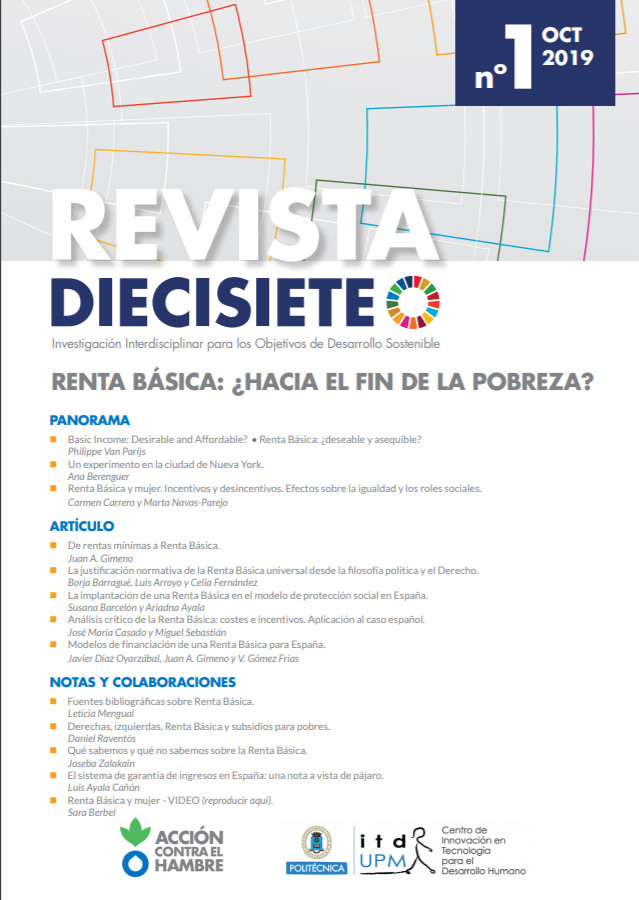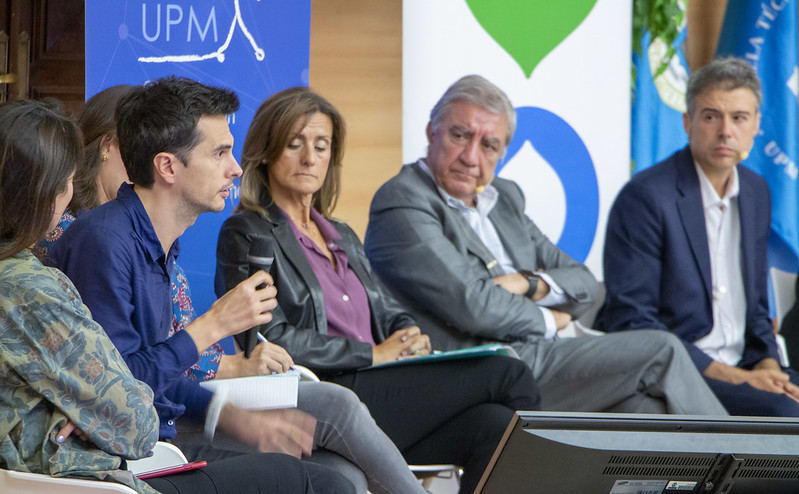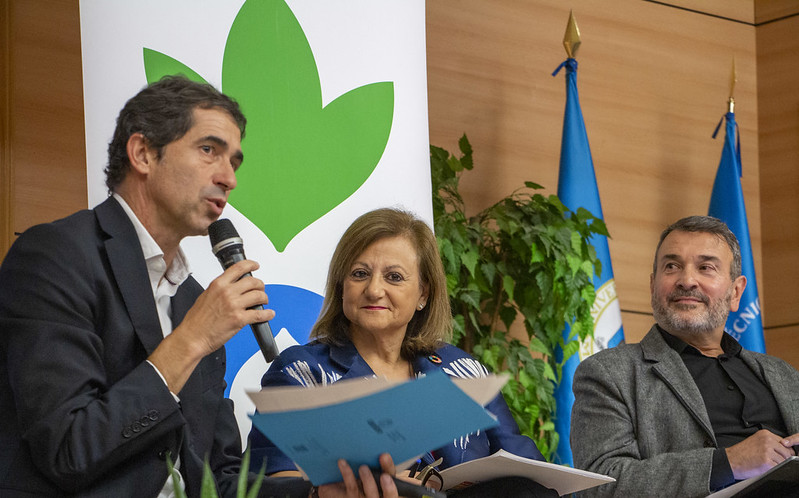On 14 October we presented the new Revista DIECISIETE (Journal SEVENTEEN), in reference to number 17 of the Sustainable Development Goals (SDGs), "Partnerships to achieve the goals", the only one that is essential for the rest of the SDGs to be achieved by 2030.
And for the first issue we brought together 20 specialists from different fields of knowledge to analyse Basic Income. Could this tool be an icon of the radical changes needed to tackle some of these goals, such as the end of poverty, hunger or inequality?
 Download the issue in PDF format
Download the issue in PDF format
The idea for this first monograph began in June 2018, when we organised an open seminar on Basic Income and for which we had a special guest of recognised international prestige, Philippe Van Parijs, co-founder of the Global Basic Income Network, and who also contributes to this first issue of the magazine.
The debate held at the UPM's School of Industry, which brought together around 200 people, began with a realisation: Employment no longer means getting out of poverty.
Ana Berenguer, former Vice President for Economic Analysis at the New York City Mayor's Office, pointed out that one third of the city's workers, i.e. one million people, are poor or very vulnerable. "If they stop receiving their weekly paycheck, they have to go to food pantries.
The current economic model is generating high levels of inequality and, with the changes that technology will bring to the labour market, these levels could increase.
The UK's NESTA recently pointed out that more than six million people in the UK are in jobs that are likely to change radically or disappear by 2030.
Could basic income be a tool to change the economic model?
Basic income is a sum of money that every citizen receives periodically from public institutions without conditions and independently of other possible sources of income.
Víctor Gómez Frías and Juan Gimeno, coordinators of this first issue of the journal, point out that basic income "would alter certain sociological and political foundations of our life in common, and whose understanding requires questions such as our identity to be posed from a philosophical or anthropological perspective".
Hence, the authors of the monograph include economists, jurists, anthropologists, engineers and sociologists.
In the debate held with the authors on 14 October at the UPM's School of Industry, the advantages of basic income as opposed to the minimum incomes that currently exist were often stressed.
The minimum income is the economic aid aimed at certain people who do not have sufficient economic resources, provided that they meet a series of requirements.
 Roundtable discussion with the authors of the monograph on Basic Income
Roundtable discussion with the authors of the monograph on Basic Income Ana Berenguer, former Vice President for Economic Analysis, New Nueva York of the New York Mayor's Office
Ana Berenguer, former Vice President for Economic Analysis, New Nueva York of the New York Mayor's Office
Ariadna Ayala, PhD in anthropology and lecturer at the UCM, points out that the minimum income is highly arbitrary and often involves assuming the insertion plan drawn up by social workers.
In France, between 30 and 50% of people who would be entitled to this income do not apply for it so as not to feel stigmatised.
Juan Gimeno, Professor of Economics and Public Finance at the UNED, recalled that in Spain the effectiveness of anti-poverty programmes is among the lowest in Europe. "The average time it takes to obtain a minimum income from the time you ask for it to the time you get it is 12 months.
"Instead of proving that I am poor so that they give me a minimum income, let's do it the other way round, let's give a guaranteed income and then, via taxes, we will see to it that it is returned according to each person's income," Gimeno points out.
Marta Navas-Parejo, visiting professor at the Carlos III University, highlights another drawback of minimum income: "it is not compatible with employment, and basic income is".
Carmen Carrero Domínguez, Professor of Labour Law at the Carlos III University, analysed Basic Income from the perspective of Gender Equality for the Journal SEVENTEEN: "A basic income that is equal for men and women puts us in a better situation than that of the minimum income".
But not all authors are in favour of basic income. Miguel Sebastián, former Minister of Industry and Professor of Economic Fundamentals at the UCM, sees high risks in the implementation of this income in Spain, which he calculates would cost 280,000 million euros per year, and recalls that the bank bailout cost 50,000 million euros.
In the same vein, José María Casado, an economist at the Bank of Spain, points out that a measure of this type has winners and losers in its definition, and in Spain we do not have sufficient microeconomic information to analyse it.
"The risk is that it requires a comprehensive transformation of our system. Receiving an income may be at the cost of others losing out along the way, and it does not necessarily have to be high incomes", Casado points out.
 Carmen Carrero Domínguez, Professor of Law, and Marta Navas-Parejo, Visiting Professor, Carlos III University, Madrid.
Carmen Carrero Domínguez, Professor of Law, and Marta Navas-Parejo, Visiting Professor, Carlos III University, Madrid.  Miguel Sebastián, former Minister of Industry, and José María Casado, economist of the Bank of Spain
Miguel Sebastián, former Minister of Industry, and José María Casado, economist of the Bank of Spain
Víctor Gómez Frías, professor of Business Administration at the UPM, explained the simulation he has carried out in the article together with Juan Gimeno and Javier Díaz, with a basic income of 430 euros. Eliminating equivalent benefits and combining it with a negative tax, these authors calculate that it would imply a rise of only three points in personal income tax.
Borja Barragué, advisor to the Ministry of Health, Consumer Affairs and Social Welfare, after a quick overview of how the debate on basic income is approached from different ideological positions, pointed out that the contemporary debate tends to emphasise only the financial and regulatory viability.
The debate also mentioned the various experiments that have been carried out on basic income, such as the one that is being implemented in New York among 2,400 families, which will be monitored for two years. Some of these families will receive $500 a month and others $900 a month.
In any case, experiments limited to a small part of the population will always have the weakness of not being able to analyse all the consequences of their universality, such as the changes they could bring about in the labour market.
 Borja Barragué, advisor at the Ministry of Health, Consumer Affairs and Social Welfare
Borja Barragué, advisor at the Ministry of Health, Consumer Affairs and Social Welfare  Juan Gimeno and Víctor Gómez Frías, coordinators of this first issue of the journal
Juan Gimeno and Víctor Gómez Frías, coordinators of this first issue of the journal
Journal SEVENTEEN, the scientific commitment to the 2030 Agenda
It is no coincidence that the first issue of the journal DIECISIETE, the first in Spanish dedicated to research on the Sustainable Development Goals, is devoted entirely to basic income.
Carlos Mataix, director of the journal together with Manuel Sánchez-Montero, gave the key points at the public presentation: "We do not believe in plywood exercises, we are talking about profound transformations and, therefore, difficult issues such as basic income must be dealt with".
SEVENTEEN is also the goal considered key to meeting the challenges of the SDGs, because it speaks of alliances and collaboration. "It is an interdisciplinary scientific journal, because we need knowledge to dialogue with each other in order to tackle the complexity of the problems we face".
Mataix also previewed the theme of the next issue: "We will talk about radical and deep collaborations, collaborations that evolve from transactional to transformational, because if 2015 was the call to action, 2019 is the call to transformation".
Cristina Gallach, High Commissioner for the 2030 Agenda, highlighted at the presentation the commitment and scientific rigour that the journal represents in order to establish transformative public policies for our citizens. "We need initiatives of this kind so that, from the public administration, we can lead the process of implementing the 2030 Agenda".
 Carlos Mataix, director of itdUPM and Journal Seventeen (revista DIECISIETE,) Cristina Gallach, high Commissioner for the 2030 agenda, and Olivier Longué, director general of Action Against Hunger Spain
Carlos Mataix, director of itdUPM and Journal Seventeen (revista DIECISIETE,) Cristina Gallach, high Commissioner for the 2030 agenda, and Olivier Longué, director general of Action Against Hunger Spain

